

DISTORTED THINKING. The Dunning-Kruger Effect. The illusion of knowledge and control. Dysfunctional Behaviors. Ignorance. Mental Frameworks. Dissonance cognitive. Biais cognitifs. Biais de confirmation. Illusory Correlation. DISTORTED THINKING. 50 Hottest Urban Legends. Rationality: A-Z - LessWrong 2.0. Swans on Tea » The Illusion of Knowledge. Over at Backreaction Current illusions such as the idea that if it’s on the internet, and especially if it’s in an oft-visited location, then it must be true (argument from popularity), if it can’t be explained in a short presentation, it must be false (argument from incredulity), if it’s not on the internet then it must be false, newer information is always better, and others.
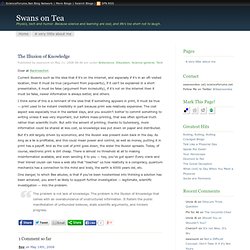
I think some of this is a remnant of the idea that if something appears in print, it must be true — print used to be instant credibility in part because print was relatively expensive. The cost aspect was especially true in the earliest days, and you wouldn’t bother to commit something to writing unless it was very important, but before mass-printing, that was often spiritual truth rather than scientific truth.
But with the advent of printing, thanks to Gutenberg, more information could be shared at less cost, so knowledge was put down on paper and distributed. The problem is not lack of knowledge. 47 Cognitive / Psychology-Proven Facts. 10 Thought Phenomena That Cause Us To Make Bad Decisions. Humans.

Every Single Cognitive Bias in One Infographic. View the high resolution version of today’s graphic by clicking here.
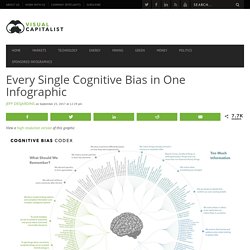
The human brain is capable of incredible things, but it’s also extremely flawed at times. Science has shown that we tend to make all sorts of mental mistakes, called “cognitive biases”, that can affect both our thinking and actions. These biases can lead to us extrapolating information from the wrong sources, seeking to confirm existing beliefs, or failing to remember events the way they actually happened! Why Facts Don’t Change Our Minds - Peqon. In 1975, researchers at Stanford invited a group of undergraduates to take part in a study about suicide.
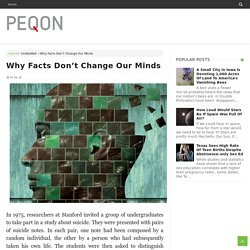
They were presented with pairs of suicide notes. In each pair, one note had been composed by a random individual, the other by a person who had subsequently taken his own life. The students were then asked to distinguish between the genuine notes and the fake ones. Some students discovered that they had a genius for the task. The benefits of having a babyface. He was America’s most wanted man – a gangster so bloodthirsty, Al Capone booted him out of his gang for being too violent.

On 20 April 1934, the police decided to get him. They’d been tipped off that he was staying at a lakeside hotel in Wisconsin, so they launched a secret operation to gun him down. But George Nelson had been blessed with a round face, large eyes and cute little nose. 15 Styles of Distorted Thinking. 15 styles of Distorted Thinking. 15 styles of Distorted Thinking Filtering: You take the negative details and magnify them while filtering out all positive aspects of a situation.

Polarized Thinking: Things are black or white, good or bad. 50 Common Cognitive Distortions. 3. Negative predictions. Overestimating the likelihood that an action will have a negative outcome. 10 distorsions cognitives qui entretiennent des émotions négatives. Le terme.
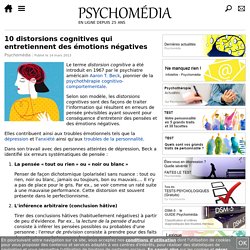
Les biais cognitifs nuisent-ils à la réflexion ? Les biais cognitifs, également appelés distorsions cognitives, sont des mécanismes qui dévient notre pensée du raisonnement rationnel.

Ils influent à notre égard les prises de décision auxquelles nous sommes confrontés. Top 10 Thinking Traps Exposed. Our minds set up many traps for us. Unless we’re aware of them, these traps can seriously hinder our ability to think rationally, leading us to bad reasoning and making stupid decisions.
Features of our minds that are meant to help us may, eventually, get us into trouble. Here are the first 5 of the most harmful of these traps and how to avoid each one of them. 1. The Anchoring Trap: Over-Relying on First Thoughts “Is the population of Turkey greater than 35 million? Lesson: Your starting point can heavily bias your thinking: initial impressions, ideas, estimates or data “anchor” subsequent thoughts. Ne vous Trumpez pas ! Ou comment « l’effet Trump » explique le comportement humain, pas seulement la politique américaine. Top 10 Common Faults In Human Thought. Humans The human mind is a wonderful thing.
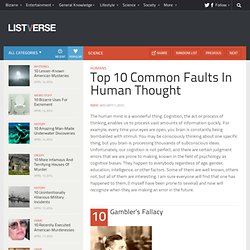
Cognition, the act or process of thinking, enables us to process vast amounts of information quickly. For example, every time your eyes are open, you brain is constantly being bombarded with stimuli. You may be consciously thinking about one specific thing, but you brain is processing thousands of subconscious ideas. Parabola del giardiniere invisibile. Da Wikipedia, l'enciclopedia libera.
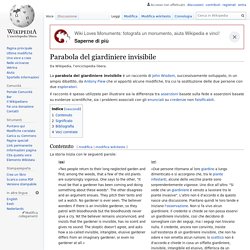
Petit recueil de 18 moisissures argumentatives pour concours de mauvaise foi. Petit recueil de non plus 18, mais 20 moisissures argumentatives à utiliser sans modération lors des concours de mauvaise foi. Ont été intégrés les plurium et l’argument de l’exotisme. Nous avons découpé ces moisissures argumentatives en trois grandes catégories : les erreurs logiques, les attaques, et les travestissements.
Mandela Effect Introduction – Debunking Mandela Effects. The Mandela Effect is a term for where a group of people all mis-remember the same detail, event or physicality. It is named after the instance in which a large group of people all shared the same memory that Nelson Mandela died prior to his actual 2013 death, usually some time in the 1980’s. The effect exploded in popularity on the internet when a peculiar example popped up where a majority of people seemed to have recalled the Berenstain Bears books as being spelled as “Berenstein” or some other variation, differing from the actual spelling. Why You Can’t Trust Yourself - Mark Manson - Pocket. Bertrand Russell famously said, “The whole problem with the world is that fools and fanatics are so certain of themselves and wiser people so full of doubts.”
Over the years, I’ve hammered on the importance of becoming comfortable with uncertainty and ambiguity, in questioning all of your most cherished beliefs and dreams, on practicing skepticism, and doubting everything, most importantly yourself. Throughout these posts, I’ve hinted at the fact that our brains are fundamentally unreliable, that we really have no clue what we’re talking about, even when we think we do, and so on. But I’ve never given concrete examples or explanations. Well, here they are. Eight reasons you can’t trust yourself, as demonstrated by psychology. Il problema dell'ignorante istruito - Rivista Studio. Le emozioni sono sopravvalutate? La democrazia è simile alle rane. Ignorant de faits contredisant nos fausses croyances. The Lesson of the Monkeys. I was first told of this experiment* by a former work colleague, and later discovered this illustration of it. It’s both illuminating and disturbing.
There is a clunky word that describes this phenomenon: filiopietism, or the reverence of forebears or tradition carried to excess. Pensiero dicotomico: vedere il mondo in bianco e nero. L’animale pandemico. COVID-19, crisi della razionalità ed ecosocialismo (di Marco Maurizi) – Voci Sinistre. Abbiamo il piacere di ospitare questo importante contributo del filosofo italiano Marco Maurizi, pensatore di punta dell’antispecismo italiano ed europeo e autore, tra le altre cose, di testi come Al di là della natura. Study: Religious fundamentalists and dogmatic individuals are more likely to believe fake news. New research provides evidence that delusion-prone individuals, dogmatic individuals, and religious fundamentalists are more likely to believe fake news. The study, which appears in the Journal of Applied Research in Memory and Cognition, suggests that the inability to detect false information is related to a failure to be actively open-minded.
The rise of online social media has led to growing concerns about the spread of unsubstantiated rumors, misleading political propaganda, and blatantly false articles designed to create viral web traffic. Even the U.S. Army has become involved in efforts to understand and combat disinformation in cyberspace. “Our interest in fake news is grounded in a general interest in understanding the common experience of believing things that are not true,” explained study author Michael V.
Three Type of Arrogance. Explanations > Relationships > Three Type of Arrogance Belief arrogance | Crowing arrogance | Perceived arrogance | So what? Arrogance can be viewed as appearing in three forms: belief, crowing and perceived, each of which is quite different. Belief arrogance Belief arrogance comes before a person is agreed as being right.
They are arrogant because they believe they are right. Perché gli stupidi si credono intelligenti? – RicPuglisi. People in higher social class have an exaggerated belief that they are better than others. The Trick To Thinking Clearer and Better – Personal Growth. Forer effect. Inattentional blindness. Hysteresis: The Phenomenon Behind the Anti-vax Movement. On the Fallibility of Memory and the Importance of Evidence. Bias cognitivi: cinque modi veloci per ingannarsi da soli. Escape the Echo Chamber - Aeon Magazine - Medium. Cognitive bias and future thinking. Bias cognitivi. Common Mythconceptions – World’s Most Contagious Falsehoods — Information is Beautiful.
Revisiting why incompetents think they’re awesome. Peut-on donner son opinion sur le covid (quand on n'est pas scientifique) ? Goodhart's law. Moral Panics / Cybercrime. Per favore, cancellate le interviste alla gente comune. Diagramma di flusso dei bias cognitivi. The Roots of Implicit Bias. Cognitive bias cheat sheet – Better Humans. The Atir-Rosenzweig-Dunning Effect: When Experts Claim To Know The Unknowable. 25 biais cognitifs qui nuisent à la pensée rationnelle. 12 biais cognitifs à déjouer pour recruteurs brillants. Cognitive bias. Cognitive bias cheat sheet. The 12 cognitive biases that prevent you from being rational. List of common misconceptions.
Common MythConceptions — Information is Beautiful. The Impossible Voyage of Noah's Ark. Top 10 Strange Phenomena of the Mind. The Straight Dope - Fighting Ignorance Since 1973. Deception. The Science of Why We Don't Believe Science. Confirmation bias - How Facebook Makes Us Dumber.
How Your Brain Tricks You Into Believing Fake News. How fake news gets into our minds, and what you can do to resist it. Pourquoi certains croient aux fake news en dépit de toute rationalité. Why We Believe Our Own Lies. People who think their opinions are superior to others are most prone to overestimating their relevant knowledge and ignoring chances to learn more. Why predictions are a lot like Pringles. Why Facts Don’t Change Our Minds.
This Article Won’t Change Your Mind - The Atlantic. Psychology of Cyberspace - The Online Disinhibition Effect. A Linguist Explains How We Write Sarcasm on the Internet. Riflessioni in libertà: Il Popolo Unico, o il tunnel di Wile E. Coyote. Perché la scienza non si comunica a suon di schiaffi – Valigia Blu. Don't Panic!: Il flusso del silenzio, l'insistenza dell'oblio. Older People Are Worse Than Young People at Telling Fact from Opinion.